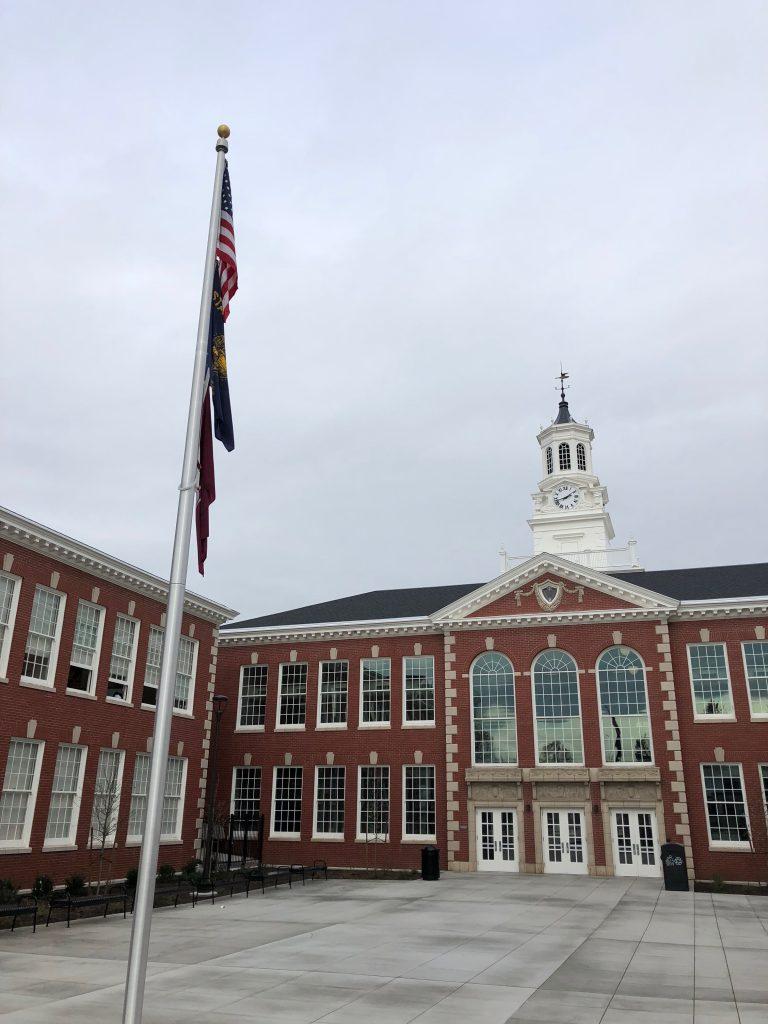
The recent announcement that Franklin will start using class time to recite the Pledge of Allegiance has spurred an onslaught of reactions from students, teachers, and community members. This statement comes after Oregon State Board of Education discovered that all high schools in Portland Public Schools were out of compliance with the state law requiring each school to provide students the opportunity to recite the Pledge of Allegiance once a week. However, this new development has sparked widespread backlash throughout the Portland community. This law has been in place for decades, but the state Board of Education is choosing to enforce it now. In our current political climate, patriotism is a politically charged action, one that public school students should not be forced to make once a week.
Before 1943, West Virginia Board of Education required that all teachers and students pledge allegiance to the flag, and the refusal to salute was treated as insubordination and was punishable by expulsion and charges of delinquency. This policy was ultimately struck down by the U.S. Supreme Court in 1943 in the case of West Virginia State Board of Education v. Barnette, as the Court ruled that a compulsory flag salute violates students’ First Amendment rights. Due to this ruling, the Oregon Supreme Court and legislation decided in the 1940s to develop a more ambiguous law for its public schools. Oregon state law requires each school district to provide students with the opportunity to recite the Pledge of Allegiance once a week, but cannot force students to do so. It is permissible in accordance to the state law to maintain respectful silence during the salute, meaning that if a student chooses to remain silent, the school must honor that decision. Many other states have comparable laws to Oregon’s, with some even requiring daily recitation.
In an anonymous online survey of just over thirty Franklin students, an overwhelming 90 percent believed that reciting the Pledge of Allegiance should not be required in public schools. While this statistic does not pertain to the entire Franklin student body, the numbers are significant. After Principal Juanita Valder made the announcement of potentially having to recite the pledge in school at the end of 2017, the school administration received a lot of pushback from teachers, parents, and students, many of whom requested opportunities to discuss the policy before implementing it.
Technical questions have been raised about the legality of using the word “God” in a public school setting and whether this respects the separation of church and state. According to the survey, many students feel uncomfortable using the word “God,” as it may not coincide with their own religious or spiritual practices. Several public schools across the country have instituted Muslim prayer rooms as a safe place for Muslim students to practice their religion. So why do they have to go into a separate room when the Christian faith is projected over the loudspeakers?
Other concerns include the effects this salute could have on the expression of political opinions. Franklin Vice Principal Emily Mather explains, “Under the current political climate, I think people are feeling less than patriotic. Some people are feeling like the flag is not something they want to pledge allegiance to right now, and [instead] express, perhaps, a rejection of those values.” Due to the current federal administration, expressing patriotism has become a very politically charged act. During a time of such political tension and anxiety, the new addition of reciting the pledge could lead to students feeling isolated in a place of public education. As one student writes, using mandatory class time to pledge allegiance could make “[students] who don’t want to stand or speak feel pressured to do so.” The nationalistic mindset of worshipping the flag also creates a disconnect for students of color who have been historically oppressed and who may feel that the flag does not represent them or their opinions. Another student writes, “I don’t believe in the Pledge of Allegiance and what America stands for. It was built off of slavery and racism. I don’t want to have to listen to my opinion disrespected in class every morning.”
Despite this opinion, many students within Portland Public Schools and at Franklin do want to express their patriotism by pledging allegiance and also feel alienated by the lack of compliance. However, using mandatory class time isn’t an appropriate way to provide students this opportunity. Instead, administration could perhaps offer a time and room for students to recite the pledge during lunch or after school.
Due to the complexities of this issue, Franklin administration is still searching for a possible alternative. “We just sort of pressed pause on the situation, and asked the district for guidance which we may or may not get,” says Mather. Until then, the Pledge of Allegiance will not be announced over the loudspeaker.
Luckily, Franklin is not alone in trying to find a solution to such a politically charged problem; there’s been feedback from a number of schools with concerns about this potential shift. In response, administrations from multiple PPS schools have gone back to the Board of Education to see if it’s possible for PPS to write a unique policy that’s separate from the state law. They have not received a definitive answer back, but this decision will affect everyone in PPS, and if denied, will only increase the political tension felt throughout the community. As one student writes, “I believe there are more powerful ways to show patriotism, through public service and social and civil justice, instead of standing and reciting a pledge that a flag company wrote.”

































